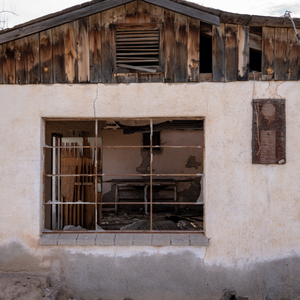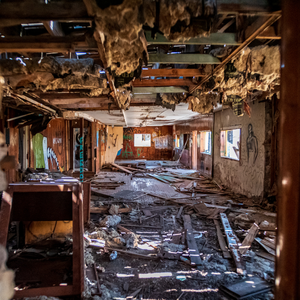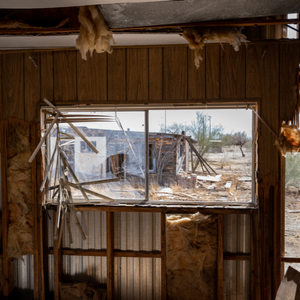
You love Fort Worth, but your house? Well, that’s another story. Maybe the roof leaks when it rains or the electrical system sparks conversations (literally). Don’t worry! You’re not stuck with a property that feels more like a science experiment than an asset.
The truth is, buyers exist for every type of property, even ones that need CPR. You just need to know how to find them and present your home correctly.
Let’s consider turning your problematic property into cash in your pocket!
Can You Sell a House in Bad Condition in Fort Worth, Texas?
Yes, you definitely can! It sounds nuts when you’re staring at that water stain on your ceiling, but Fort Worth’s market is pretty forgiving.
There are people actively hunting for fixer-uppers because they want to do a project or because they flip houses for a living.
Fort Worth keeps growing, which means people need places to live at every price point. Your beat-up house might be perfect for someone’s first investment property. It may also be fit for a family who’s handy and wants to build some sweat equity.
Plus, buying something that needs work is often the only way people can afford to get into certain neighborhoods.
You’ve got options here. Some homeowners sell fast to cash buyers who don’t care about the leaky pipes. Others find a real estate professional, like the team at Southern Hills Home Buyers, who knows how to sell houses that aren’t Instagram-ready. Some people do quick fixes first, just enough to make the place not scary.
What Does “Poor Condition” Really Mean for Your Property?
“Poor condition” covers a lot of range. It can mean a property that “needs paint” or a home “condemned by the city,” so let’s break it down.
Uninhabitable Properties
This is the rough stuff. We’re talking houses where you literally can’t live safely.
The foundation is doing weird things that foundations shouldn’t do. The electrical system might be dangerous. There’s so much mold that it looks like a science experiment gone wrong. Or maybe the roof gave up entirely and now you’ve got trees growing inside.
These houses usually go to investors who gut everything or tear everything down.
They know what they’re getting into and budget for massive renovation costs. Your disaster house might look hopeless to you, but to them, it’s just math. They determine if they can make money after fixing everything, or offer to sell your home for cash in Fort Worth or nearby cities if the numbers make sense.
Homes Requiring Major Repairs
Your house works, but barely. The air conditioning died sometime during the Bush administration (pick one). The roof needs to be completely redone. The plumbing makes those gurgling sounds that keep you up at night.
Or maybe the foundation has some settling issues that turned your doors into weird shapes.
These places attract investors and regular buyers who think they can handle big projects.
Banks will usually still lend on these houses, which opens up more buyer possibilities than the truly scary ones.
Properties Needing Cosmetic Updates

This is the “ugly but functional” category. Everything works, it just looks terrible.
The kitchen cabinets are that weird wood-grain laminate from the 80s. The carpet has seen things. The paint is peeling. The bathroom looks like a time capsule from when everyone thought mint green was classy.
These houses sell well because many can see past ugly wallpaper and outdated fixtures.
First-time buyers love them because they can get into good neighborhoods for less money. Investors like them because cosmetic work is cheaper than rebuilding a foundation, making it easier for you to sell your home for cash in Arlington or nearby cities.
Step-by-Step Guide: How to Sell a House in Poor Condition in Fort Worth, Texas
Selling a busted house isn’t like selling a normal one, where you just slap some fresh flowers on the counter and call it a day. You need a game plan, and you need to be smart about it.
Step 1: Assess the Damage and Required Home Repairs
First off, you need to document every single thing that’s wrong and we mean everything. Do you have to lift that bedroom door and jiggle it to close? That counts. The bathroom faucet that only gives you scalding hot or ice-cold water? Write it down.
While making your list, you must take photos, too. Not pretty photos, but evidence photos. That way, when contractors give you estimates later or buyers ask questions, you have visual proof of what you’re dealing with.
Don’t try to figure out why things are broken. Leave that to the professionals.
Step 2: Decide Whether to Fix or Sell As-Is
Most people mess up here because they get emotional instead of practical. Their hearts might say, “Fix everything,” but their bank accounts might have different opinions.
But you must ask yourself: Are you handy or the type of person who calls someone to change a lightbulb?
If you’re not comfortable with tools and don’t have reliable contractor connections, every repair will cost you more and take longer than you think.
Also, consider your current life situation. If you’re stressed about money or dealing with family issues, taking on a major renovation might push you over the edge.
Sometimes, the smart money is on cutting your losses and moving on with your life.
Step 3: Choose Your Selling Strategy and Options
Ah, time to pick your poison. Each way of selling has its headaches and benefits, so choose carefully.
Traditional Sale with Real Estate Professional
This is for people who want to squeeze every dollar out of their house and don’t mind waiting. You’ll pay agent commissions, but a good agent earns their money by knowing how to market problem houses to the right people.
Find an agent who doesn’t back out when they see your place.
You want someone who gets excited about challenges and has sold plenty of fixer-uppers before.
Selling Your Home As-Is to End Buyers
This is putting up a big sign that says “project for sale” and hoping someone with vision shows up.
It works best when your house has good bones but looks outdated.
You’re targeting young couples who watch too many renovation videos on YouTube or older people who’ve been through renovations before. These people enjoy fixing things up.
Targeting Investor Buyers
Investors and cash buyers can also help you out. They buy houses that scare everyone else and turn them into something profitable.
They mostly run a business, meaning they make decisions with their heads, not their hearts.
The best thing about selling to investors is that they’ve seen everything. They’re also usually pretty fast because they don’t need mortgage approval.
Moreover, they won’t change their minds after sleeping on it.
Step 4: Price Your Property Realistically
Pricing a fixer-upper is difficult because you can’t just look at what nice houses in your neighborhood sold for. You need to do all of the following:
Understand Fort Worth Property Values
Fort Worth is having a moment right now. Even rough houses in decent areas sell because people are getting priced out of the prettier neighborhoods.
Your beat-up house might be someone’s chance to get into an area they couldn’t otherwise afford.
But don’t get carried away. Just because your neighbor’s renovated house sold for $200k doesn’t mean your fixer-upper is worth $180k.
Calculate Repair Costs vs. Sale Price
Call contractors for rough estimates, even if you’re not planning to do the work. Tell them upfront that you’re thinking about selling and just need estimates.
Take whatever number they give you and add 20% because everything always costs more than the first estimate. Then factor that into your pricing.
Market Analysis for Distressed Properties
Don’t use those fancy online home value tools. They’re useless for houses like yours. Those algorithms assume your house is in decent shape.
Instead, look for houses with descriptions like “investor special” or “sold as-is.”
You should always pay attention to how long they have been on the market. If similar houses sell in a week, you know the demand is there.
Step 5: Prepare Your Poor Condition House for Sale
Alright, so you’ve decided to sell. Now you need to make your disaster look presentable without spending your life savings.
Essential Repairs That Add Value
You’re not trying to win any home design awards here. You just want to fix the stuff that makes people say “ew.”
Well, it makes sense to start with anything that could kill someone. We’re talking about loose railings, exposed wires, and that step that’s a booby trap.
Safety stuff first, then move on to the things that make your house look abandoned. A broken front door says “crack house.” A working front door says “fixer-upper opportunity.” This has a big difference in buyer psychology, trust us.
Don’t go crazy. Replacing a $50 bathroom faucet that drips constantly is a smart move. But renovating the entire bathroom? You’ve lost your mind.
Save the big dreams for someone else’s wallet.
Cleaning and Decluttering Strategies
This might be the cheapest way to improve your house’s chances.
Rent a dumpster for a weekend and declutter. Throw away that pile of magazines from 2003 and donate that exercise bike that’s now a very expensive clothes hanger.
Clean everything like your mother-in-law is coming to visit and judge your life choices.
Scrub the walls, wash the windows, and for the love of all that’s holy, deal with any weird smells. Buyers can overlook many visual problems, but they’re out if your house smells funny.
Basic Staging for Distressed Properties
You’re not staging for a magazine shoot. You’re staging to help people see past the problems.
One tip would be to remove most of your furniture so the rooms look bigger. Leave just enough so people can tell what each room is supposed to be.
Also, put a fresh coat of cheap paint on the worst walls. Neutral colors only (nobody cares about your artistic vision right now). The goal is to make people think “this could work” instead of “this is hopeless.”
Step 6: Market Your House in Bad Condition
Now you need to tell the world about your problem child without scaring everyone away.
Writing Honest Property Descriptions
Be upfront about the issues, but don’t write your listing like a confession at a support group.
Instead of “needs everything fixed,” try “great opportunity for the right buyer.” Instead of “foundation problems,” maybe “solid bones with some settling.”
You’re not lying. You’re just not leading with the bad news. Mention the good stuff first, like that big yard, great location, and original hardwood under that terrible carpet. Start there, then get to the reality check.
Professional Photography for Distressed Homes
We know you can’t exactly pose your house as if it’s ready for the Architectural Digest YouTube channel. But you can make it look like it has potential instead of looking condemned.
Take photos on a sunny day when natural light makes everything look better.
Also, clean up any obvious trash or debris before the photographer arrives.
Find the Right Buyers

You’re not marketing to families with kids who want to move in next weekend. You’re looking for people who want new projects.
Post on social media in investor or cash-buying groups. Let contractors know you’re selling because they often know people looking for fixer-uppers.
Don’t waste time with buyers who ask if everything works perfectly. They’re not your people.
Your people are the ones asking about square footage and lot size.
Step 7: Handle Legal Requirements and Disclosures
Time for the paperwork nobody likes but everybody needs.
Disclosure Requirements
Texas law says you have to tell buyers about problems you know about. Don’t ever think about playing dumb.
If you know the roof leaks, say so. If the foundation has issues, mention it. If there’s a family of possums living in the attic, that should probably come up.
The disclosure form looks scary, but it’s actually for you. It protects you from getting sued later when the buyer discovers that the weird noise in the walls wasn’t just the house “settling.”
As-Is Contract Protections
When you sell as-is, make sure your contract says that.
You want language that clarifies you’re not fixing anything after the sale and that you’re not promising last-minute repair requests.
Your agent or attorney should handle this, but read it yourself. If the contract has wiggle room for the buyer to demand repairs, you might end up back where you started.
Property Tax Issues
If you’re behind on property taxes, deal with it now. This is if you don’t want your sale to get killed. The taxes will get paid from your proceeds anyway, so there’s no hiding from them.
Get current on your debts and have those numbers ready for potential buyers.
They need to know what they’re getting into, and you need to know how much money you’ll walk away with.
Step 8: Deal With The Challenges
Selling a rough house can make your head ache, that’s for sure. Here’s what you’re probably going to deal with.
Financing Issues for Buyers
Most banks don’t get excited about lending money on houses that might fall.
Your typical family buyer who needs a mortgage might love your house, but their lender will take one look and say, “Absolutely not.”
This is why cash buyers and investors are the best options. They don’t need anyone’s permission to buy your house.
Regular buyers might need to look into renovation loans, which are expensive and take a long time to process. Don’t hold your breath waiting for someone to figure this out.
Home Inspection Concerns
Every buyer will want an inspection, and yours will read like a horror novel. You should expect that.
The inspector will find stuff you didn’t even know was broken. That’s just part of it.
You must set expectations up front to avoid being shocked by all these. If you’ve been honest about the condition, the inspection shouldn’t contain any shocking surprises.
Bad inspections kill deals when buyers aren’t expecting them, not when they know what they’re getting into.
Negotiating Repair Requests
Selling as-is pays off. When buyers come back asking you to fix a bunch of stuff, you can say, “Nope, we talked about this.”
Your house was priced assuming they’d handle the repairs themselves.
You need to be firm about this. If you start agreeing to fix things after the inspection, you’ll end up spending money you don’t have and delaying your closing.
The buyer knew what they were getting into when they made the offer.
Step 9: Close the Sale

The closing process for a fixer-upper isn’t much different from a regular sale, except everyone’s a little more nervous.
Your buyer might wonder if they’ve lost their minds, and you might wonder if you should have tried to fix more stuff.
Stay focused on closing. Get all your paperwork ready ahead of time. If there are any last-minute issues with the title or liens, deal with them fast.
Your buyer might already be having second thoughts, so you don’t want to give them an excuse to walk away.
Bring your house keys, garage door openers, and any manuals or warranties for stuff that works.
Be prepared to sign many papers and answer questions about things you probably don’t know much about.
Why Choose Cash Buyers for Your Poor-Condition Property
If all this traditional selling stuff sounds like too much work, there’s another option that might fit your situation better.
Cash buyers are experts in exactly what you’ve got… houses that need work. They’re not looking for their dream home; they’re looking for their next business project. That means they think differently about problems than regular buyers do.
These buyers can usually close in two weeks or less because they don’t need bank approval. They’ve seen everything, so your broken AC and outdated kitchen won’t scare them off.
They’ll make you an offer based on what your house is worth after repairs, minus what it costs to get it there, minus their profit.
Yes, you’ll get less money than you might get on the open market. But you’ll also get simplicity.
Key Takeaways: Successfully Selling a House in Bad Condition in Fort Worth, Texas
Selling a house in rough shape isn’t the end of the world. You just need to use a different approach. Be honest about what you’re dealing with, price it realistically, and target the right buyers.
Fort Worth’s growing market means there’s demand for fixer-uppers, so don’t panic about finding a buyer. Just focus on presenting your house as an opportunity rather than a problem.
If you want to skip the hassle of showings, repairs, and uncertain timelines, consider working with Southern Hills Home Buyers. We purchase houses in any condition throughout the Fort Worth area. We can close in as little as two weeks. Contact us at (214) 225-3042 or fill out the form below to get a no-obligation offer!
Helpful Fort Worth Blog Articles
- Is Fort Worth, TX, a Good Place to Live?
- Worst Neighborhoods In Fort Worth, TX
- What Happens if an Appraisal Comes in Low in Fort Worth, TX?
- How To Avoid A House Foreclosure In Fort Worth, TX
- Fun Facts About Fort Worth, TX
- How To Sell An Inherited House In Fort Worth, TX
- Selling My House On My Own In Fort Worth, TX
- Selling a House in Bad Condition in Fort Worth, Texas
- Capital Gains Tax After Selling a House in Fort Worth, TX
- How Long Does an Eviction Process Take in Fort Worth, TX
- Contingencies on Selling A House in Fort Worth, Texas
- Selling Your Elderly Parents’ Home in Fort Worth, TX
- Sell a House As Is Without Inspection in Fort Worth, TX

